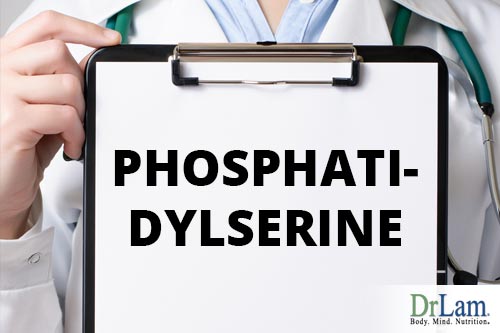 Phosphatidylserine is part of the phospholipid family, a group of compounds that are found in all human cell membranes. Phosphatidylserine is naturally found in small amounts in egg yolks and other foods. In fact, most people consume 75 – 185 mg of phosphatidylserine daily in their regular diet. But what is phosphatidylserine as a supplement? While this supplement was previously sourced from cow brains, after scrutiny due to concerns of mad cow disease, the supplements most commonly available today are from plant sources such as soybean lecithin, sunflower lecithin, and cabbage. The supplements are derived from two fatty acids found in the plant sources. Of course the cow brain supplements contained both saturated and unsaturated fatty acids, while plant sources contain only unsaturated fatty acids, but studies have proven both supplement sources to be equally effective. Phosphatidylserine has long been studied for its ability to reduce the risk of dementia and aid in cognitive function in the elderly due to its dopamine enhancing properties. Recently it has also been used to aid in Adrenal Fatigue Syndrome (AFS) recovery by reducing the production of the hormone cortisol, which is responsible for fighting stress and keeping you calm.
Phosphatidylserine is part of the phospholipid family, a group of compounds that are found in all human cell membranes. Phosphatidylserine is naturally found in small amounts in egg yolks and other foods. In fact, most people consume 75 – 185 mg of phosphatidylserine daily in their regular diet. But what is phosphatidylserine as a supplement? While this supplement was previously sourced from cow brains, after scrutiny due to concerns of mad cow disease, the supplements most commonly available today are from plant sources such as soybean lecithin, sunflower lecithin, and cabbage. The supplements are derived from two fatty acids found in the plant sources. Of course the cow brain supplements contained both saturated and unsaturated fatty acids, while plant sources contain only unsaturated fatty acids, but studies have proven both supplement sources to be equally effective. Phosphatidylserine has long been studied for its ability to reduce the risk of dementia and aid in cognitive function in the elderly due to its dopamine enhancing properties. Recently it has also been used to aid in Adrenal Fatigue Syndrome (AFS) recovery by reducing the production of the hormone cortisol, which is responsible for fighting stress and keeping you calm.
Those who suffer from adrenal fatigue often find it hard to handle even the tiniest amounts of stress, whether physical, emotional, or biological. The body’s systems don’t discriminate between the different types of stress; they attack them all the same way. The adrenal glands, which are small walnut-shaped glands that sit on top of the kidneys, are responsible for producing over 50 hormones. The most important one is cortisol. You’ve likely heard about cortisol many times, especially if you are suffering from AFS. Cortisol production is necessary for the body to combat stress, but too much cortisol production can give you a bit of extra fat in the waistline. There is often a “which came first, the chicken or the egg?” principle at work here: are people overweight because of too much cortisol production and secretion, or are people producing and secreting too much cortisol because they are overweight? Are people overly stressed because of dysregulation of cortisol production and secretion, or is cortisol production and secretion responsible for people being overly stressed? To understand the underlying process, it’s important to look at how the adrenal glands produce cortisol and what causes an imbalance. Ultimately, however, no matter what causes what, it is imperative to your body’s ability to function that the production and secretion of cortisol be carefully regulated.
 Cortisol is an essential hormone that is mainly responsible for your body’s fight-or-flight response. When your brain senses stress of any kind, it tells the adrenals to prepare to fight by producing additional cortisol. The brain also signals the cardiovascular system to prepare by filling the lungs with extra and increasing blood flow to organs and arteries. In a normal, healthy body, this helps the body to hang in there and fight through the stressful event, or if fighting isn’t a good option, to take flight and retreat for protection. In those with adrenal fatigue, however, the fight response induces panic, and the body can’t calm down from the response even if the stress dissipates or you choose the flight response. The body is flooded with cortisol and epinephrine and the mechanisms that excrete or neutralize these hormones don’t function properly. This is why you have a feeling of being constantly electrically charged, and yet you’re exhausted at the same time. The fight response overwhelms the body and causes myriad adverse effects.
Cortisol is an essential hormone that is mainly responsible for your body’s fight-or-flight response. When your brain senses stress of any kind, it tells the adrenals to prepare to fight by producing additional cortisol. The brain also signals the cardiovascular system to prepare by filling the lungs with extra and increasing blood flow to organs and arteries. In a normal, healthy body, this helps the body to hang in there and fight through the stressful event, or if fighting isn’t a good option, to take flight and retreat for protection. In those with adrenal fatigue, however, the fight response induces panic, and the body can’t calm down from the response even if the stress dissipates or you choose the flight response. The body is flooded with cortisol and epinephrine and the mechanisms that excrete or neutralize these hormones don’t function properly. This is why you have a feeling of being constantly electrically charged, and yet you’re exhausted at the same time. The fight response overwhelms the body and causes myriad adverse effects.
When your adrenals can’t handle the stress you are facing because they are burnt out or lack sufficient nutrients to create more hormones, they may suppress or stop cortisol production altogether, wreaking further havoc on your body. Symptoms of this stage of AFS include thyroid malfunction, sexual and reproductive issues, and extreme fatigue. The adrenals can also go into overdrive, producing more cortisol than your body can handle, completely upsetting your body in the opposite direction, leaving you feeling constantly wired and unable to rest at all. So now you are anxious, wired, and tired all day, but you can’t sleep because your body is producing too much cortisol. As adrenal fatigue progresses through different stages, a spectrum of symptoms may present. In a healthy, fully functioning body, cortisol production naturally tapers off to its lowest at night, allowing you to relax and sleep with long periods of slow wave (deep) sleep, and peaks when you wake up in the morning, helping you to get going and handle the stress of your morning routine. During the rest of the day, cortisol production can fire up and calm down when as needed. However, when the body is constantly bombarded by different stresses, whether they be physical, mental, social, or emotional, the balance is lost and a host of problems can arise in the body. These problems often cause a worsening cycle of stress, affecting work, school, home, and family life. It is important to listen to your body and figure out what is going on so you can fix it before the problem becomes a crisis.
 High cortisol levels can be dangerous and cause suppression of TSH (thyroid hormone), higher than normal blood glucose levels (leading to hyperglycemia and eventually type 2 diabetes), suppressed pituitary function (lowering testosterone), sluggish liver detoxification, gut inflammation, decreased immunity (leading to infection), neurodegenerative disorders that can break down the blood-brain barrier, and imbalance of the circadian rhythm. An imbalanced circadian rhythm can result in learning and memory issues as well as insomnia/irregular sleep patterns.
High cortisol levels can be dangerous and cause suppression of TSH (thyroid hormone), higher than normal blood glucose levels (leading to hyperglycemia and eventually type 2 diabetes), suppressed pituitary function (lowering testosterone), sluggish liver detoxification, gut inflammation, decreased immunity (leading to infection), neurodegenerative disorders that can break down the blood-brain barrier, and imbalance of the circadian rhythm. An imbalanced circadian rhythm can result in learning and memory issues as well as insomnia/irregular sleep patterns.
It is a well-known and well-documented fact that the adrenal glands regulate stress, and of course, when they can’t do the job, you suffer extreme fatigue and other side effects. However, with much research, is has been discovered that the body’s organs and systems are more interconnected than previously thought. It is now known that many other organs also produce, secrete, and regulate hormones. In fact, to handle stress in the body, most of your organs, systems, pathways, and chemical reactions work together to bear the burden, especially when the main system responsible for a given function is dysregulated, thus reducing the load on that fatigued organ or system. In the case of AFS, there are many responses working together to keep the body in balance when cortisol levels go crazy or slow down to a crawl, and just a slight disruption of this delicate balance can cause unpleasant symptoms. This is what is called the NeuroEndoMetabolic (NEM) Stress Response, which is comprised of six core circuits:
Hormonal Circuit – Includes adrenal glands, thyroid, and ovaries/testes. Regulates thyroid function, body temperature, and stress hormones (including cortisol). Imbalance causes fatigue, reduced libido, sluggish thyroid, weight gain, hair loss, infertility, and miscarriage.
Metabolic Circuit - Includes the thyroid, pancreas, and liver. Regulates delivery of fuel to body. Imbalance causes reduced energy and weight regulation, sugar cravings, weight gain, hypoglycemia, type 2 diabetes, and loss of muscle mass.
NeuroAffective Circuit - Occurs in the central nervous system and includes the autonomic nervous system, brain, and gut. Controls mood, sleep, and cognition. An imbalance leads to anxiety, mood swings, insomnia, and lack of concentration.
Cardionomic Circuit - Includes the heart, blood vessels, and lungs. Imbalance can produce high blood pressure, heart palpitations, cardiac arrhythmia, dizziness, and shortness of breath. High cortisol levels have a very negative effect on the cardionomic response as they keep the body in a constant state of fight or flight.
Inflammatory Circuit - Includes the immune system, microbiome, and gut. Imbalance can lead to frequent illness and recurrent infections with prolonged healing times, food and chemical sensitivities, yeast infections, leaky gut, exacerbation of autoimmune disorders, and musculoskeletal pain.
Detoxification Circuit – Includes the kidneys, lymphatic system, and liver. Imbalance leads to a compromised immune system, environmental and chemical sensitivities, and medication and supplement intolerance.
 When your body produces too much cortisol, you may experience feelings of anxiety, mood swings, raised body temperature, and insomnia. The hormonal circuit is the component primarily responsible for regulating your cortisol balance. When it is compromised, the neuroaffective and metabolic circuits jump in to help absorb the stress, but this throws off your mood, thyroid function, and many other vital hormone-supported organs and systems. Now the goal is clearly to regulate the body’s various functions by normalizing all of the systems within the NEM Stress Response so they can work together effectively to combat stress and fatigue in the body. Only then can your adrenal function return to normal.
When your body produces too much cortisol, you may experience feelings of anxiety, mood swings, raised body temperature, and insomnia. The hormonal circuit is the component primarily responsible for regulating your cortisol balance. When it is compromised, the neuroaffective and metabolic circuits jump in to help absorb the stress, but this throws off your mood, thyroid function, and many other vital hormone-supported organs and systems. Now the goal is clearly to regulate the body’s various functions by normalizing all of the systems within the NEM Stress Response so they can work together effectively to combat stress and fatigue in the body. Only then can your adrenal function return to normal.
It is therefore important to consider methods of lowering the production and secretion of the stress hormone cortisol, as this could effectively reverse these undesirable responses and get the adrenal glands back to normal function when the cortisol levels are uncontrollably high. The catch-22 is that you need adequate slow wave (deep) sleep for regular cortisol production and rest cycles, and when you are raging on excess cortisol, you just can’t sleep it off. So, what do you do to calm the nerves and reduce the stress?
We’ve already addressed the question “what is phosphatidylserine?” So now, what is phosphatidylserine doing to help your body? Phosphatidylserine supplements can lower your heightened cortisol levels when your body can’t naturally regulate its hormone production. Phosphatidylserine works by creating a neurotransmitter function that helps maintain the integrity of the cell structure and the plasticity of neuronal cell membranes. Basically, it tells the brain to protect the healthy cells and get rid of the extra cortisol, allowing you to calm down and recover faster from a stressful event. When your cortisol levels drop, you should be able to rest, and your body will eventually repair itself and recover from adrenal fatigue.
In a study of college athletes in which blood samples were taken before and after intense exercise to measure cortisol levels, researchers found a dramatic reduction in cortisol levels when the subjects took a 600 mg phosphatidylserine supplement immediately after exercising. The subjects reported feeling calmer faster and were able to exercise again more quickly than the subjects who were given a placebo. The blood samples showed a measurable reduction in cortisol after taking phosphatidylserine supplements. The same effect can be beneficial for other kinds of stress as well, since the process of cortisol production is the same biologically, regardless of the emotional or physical cause of stress.
Taking 600 mg of phosphatidylserine for as little as 10 days has been shown to dramatically reduce cortisol levels – up to 35%. It can be taken safely every day for up to three months (there are no studies longer than three months at this time). There are no known adverse side effects of phosphatidylserine supplements, so they are relatively safe to take and use for an extended period of time as therapy for AFS, depending on your stage of adrenal fatigue and your cortisol levels.
 Adding a phosphatidylserine supplement to your recovery plan could be a very helpful step in your adrenal fatigue recovery. By reducing and regulating your cortisol production and secretion, you should be able to start falling asleep faster and staying asleep longer, eventually achieving a good, steady sleep pattern that will help your body re-establish healthy, regular cortisol production. This will lessen the burden on your adrenal glands, allowing them to rest, recover, and normalize. Once your adrenal glands are back to producing and secreting cortisol in regular amounts and at regular times, you should begin to feel less fatigued and will be able to pinpoint and work on some of the other imbalances in your body.
Adding a phosphatidylserine supplement to your recovery plan could be a very helpful step in your adrenal fatigue recovery. By reducing and regulating your cortisol production and secretion, you should be able to start falling asleep faster and staying asleep longer, eventually achieving a good, steady sleep pattern that will help your body re-establish healthy, regular cortisol production. This will lessen the burden on your adrenal glands, allowing them to rest, recover, and normalize. Once your adrenal glands are back to producing and secreting cortisol in regular amounts and at regular times, you should begin to feel less fatigued and will be able to pinpoint and work on some of the other imbalances in your body.
However, do be sure to contact a healthcare professional who knows about the different stages of adrenal fatigue and the way cortisol affects the body. Taking phosphatidylserine when your cortisol levels are already low might be detrimental. The timing of when to take phosphatidylserine is also very important because it might not be effective for those who have just started their recovery journey. It is crucial to understand how to match the body’s state to the supplementation schedule and dosage. Many people try to take this compound much like a sleeping pill and develop paradoxical reactions. The more advanced the AFS, the higher the risk of such a reaction. It is also important to note that not all manufacturing process is the same. Some brands are more effective because of their specialized manufacturing process to enhance bioavailability.
Adrenal fatigue can truly take a toll on your life and general well-being, causing extreme symptoms in your entire body. Listening to your body is the best way to stay in a state of overall health, so if something just doesn’t feel right you should take steps to correct it. The body doesn’t lie. If something is imbalanced or irregular, you will see symptoms. Extreme fatigue and inability to handle stress are a couple of obvious signs that your adrenal function is low or compromised. Now that you know what is phosphatidylserine, these supplements may be worth a try to lower your cortisol levels and help regulate your adrenal function.
The modern world is only just becoming aware of the dangers of ongoing high cortisol levels and the damage they can do to every system in your body. As a result, strategies for reducing this problem are in their infancy, but that doesn't mean that you just have to accept this health risk. If you're looking for more strategies to manage cortisol levels, when here's where to start:
Call our team on +1 (626) 571-1234 or click here for more information on supplementing and other strategies for relieving Adrenal Fatigue or other stress related issues.
